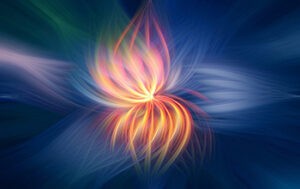
Who is God? We might call God by different names – Ishwar, Allah, Father, Mother-Father God, Bhagavan, Shiva, Vishnu, etc., but God is God by any other name. As Shakespeare would put it, a rose is a rose is a rose by any other name. Hindus generally believe God is the omnipresent Supersoul (Paramathma/Brahman) or all-pervading supreme light (Paramjyothi).
Agathiyar, a Thamil poet who lived in the 6th or 7th century BC wrote that God is someone that can have form, or no form, someone that is the infinite presence inside the entire universe and outside it, the life force of living forms, the director of life forms, the absolutely unmatched (Agathiyar Vaidhya Sadhagam – Kaappu):
அருவுருவா யரூபமுமா யடங்காத பொருளாகி அடங்கலாகி
அருவுருவா யண்டபகி ரன்டத்து உள்ளுமாய்ப் புறத்துமாய்
ஒருவுருவா யுயிர்க்குயிரா யுயிரில்நிறைந் தியங்கிநிற்கு மொப்பிலானே
கருவுருவாய் வைத்தியத்தின் சதகமிதை வழுத்தவுநீ காப்புத்தானே.
Ninth century Thamil poet Maanikkavaasagar described God in similar terms: God is the ether, earth, air, fire, the physical body, the life force, the concrete matter, the abstract matter, the ruler of everything and the puppeteer of ego-filled humans (8th Thirumurai, Thiruvaasagam):
வானாகி மண்ணாகி வளியாகி ஒளியாகி
ஊனாகி உயிராகி உண்மையுமாய் இன்மையுமாய்
கோனாகி யானெனதென் றவரவரைக் கூத்தாட்டு
வானாகி நின்றாயை என்சொல்லி வாழ்த்துவனே
In another poem (Thiruvempaavai), Maanikkavaasagar referred to God as a supreme magnificent light that has no beginning or end: ஆதியும் அந்தமும் இல்லா அரும்பெரும் சோதி ….
Thus, most Hindus understand God as the Supersoul (Paramathma) or supreme light (Paramjyothi / Arutperumjyothi). Hinduism also refers to the divine feminine, creative energy of God as Parashakthi. Hence the concept of depicting God as a glorious, complementing blend of masculine and feminine energies and the tradition of lovingly worshipping Him as Ardhanaareeshwara, Ammaiappa (Mother-Father God), Lakshmi-Narayana or Radhe-Krishna – the half male and half female forms.
If God encompasses all energy, including feminine energy, why do most of us refer to Him as He? Probably because of our patriarchal tradition, which believes in the man being the protector.
While Hinduism is monotheistic and regards God as the Supersoul, why would most Hindus worship God in different human forms?
Vishnu, Shiva, Ram, Krishna, and other Avathars incarnated on Earth as humans with a mission. The mission was to inspire humans to realize the divinity within. However, people must have been in so much awe of their divine qualities that they must have started to give their power away to them, eventually deifying them and relying on them to heal and comfort them. In addition to these ascended masters/deities, other deities might have been created to represent other divine qualities to cater to the needs of the human mind. The tradition of praying to these deities continues to exist even today. My grandmother would tell me, I am not to judge anyone and that it does not matter which form of God one prays to as long as their devotion is genuine.
The Hindus have created statues of deities with stone, clay, wood, or metal. The deities sometimes have many heads, to symbolically represent super-human wisdom and many arms to symbolize their many capabilities. In their hands they are depicted to hold many weapons to indicate their protective abilities and their hand gestures show ways of surrender. Sometimes, they are portrayed as standing on a lotus flower to denote enlightenment. These statues are placed under trees, on hill-tops, on river banks, on sea shores, in temples, inside homes, outside homes, in workplaces, in street corners and at village entrances as reminders of divinity. Some offer their salutations, humility and gratitude to them by prostrating themselves at their feet.
In Hinduism there are also 33 types [sometimes interpreted as 33 crores] of devas and devthas (angelic beings) who are assigned different responsibilities and prayed to for the procurement of specific benefits. To a non-Hindu, Hindus might appear to believe in many Gods, i.e., deities, but most Hindus are aware that their Athma or soul is a part and parcel of Paramathma or Supersoul and that they are not their body; they are in essence, souls. As such they are powerful. However, being embodied in this human form, when challenging situations arise, they turn to these deities who have experienced human lives for guidance. I have personally learned to think of my deities as beings similar to my spirit guides, who are waiting on their wings to be asked for help.
There is one God and He is the same God in all our religious beliefs. In fact, He gave the freewill and inspiration to the people who started the various religions so that we could appreciate the pluralistic differences, and evolve towards the realization that we are all part and parcel of the ONE Source.
Note: I’ve tried to spell Indian words phonetically so that Westerners will get an idea of the correct pronunciation. My name is pronounced Geetha although spelt Gita. Going by my spelling, my Western friends call me Geeta or Geeda. An American friend in an ashram in the US, was talking about how much she enjoyed the ‘curtans’ because it was spelt ‘kirtans.’ What she meant was ‘keerthans’ (songs in praise of God). I did not blame the sweet girl.
